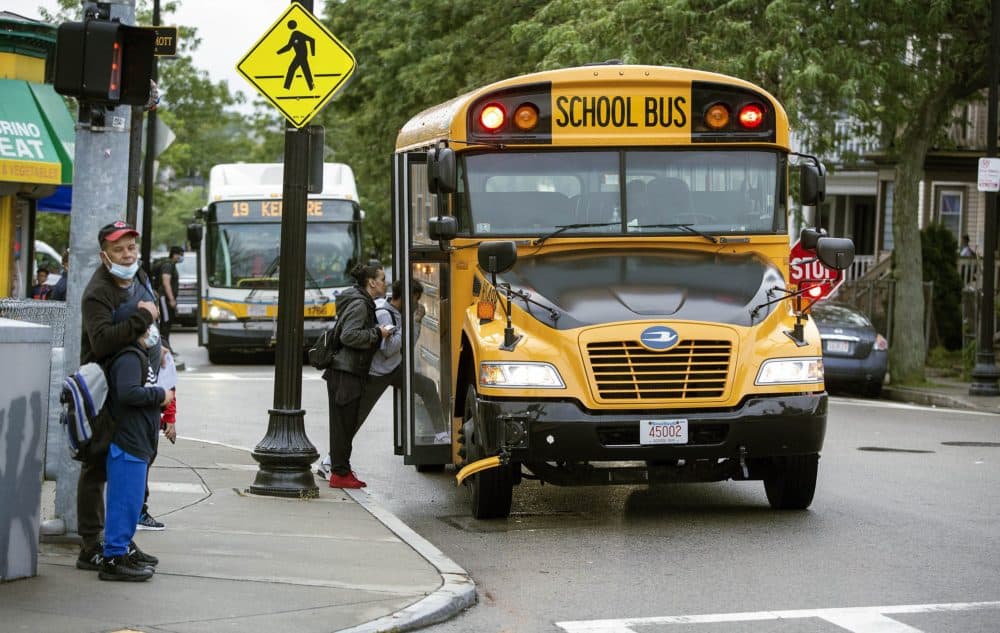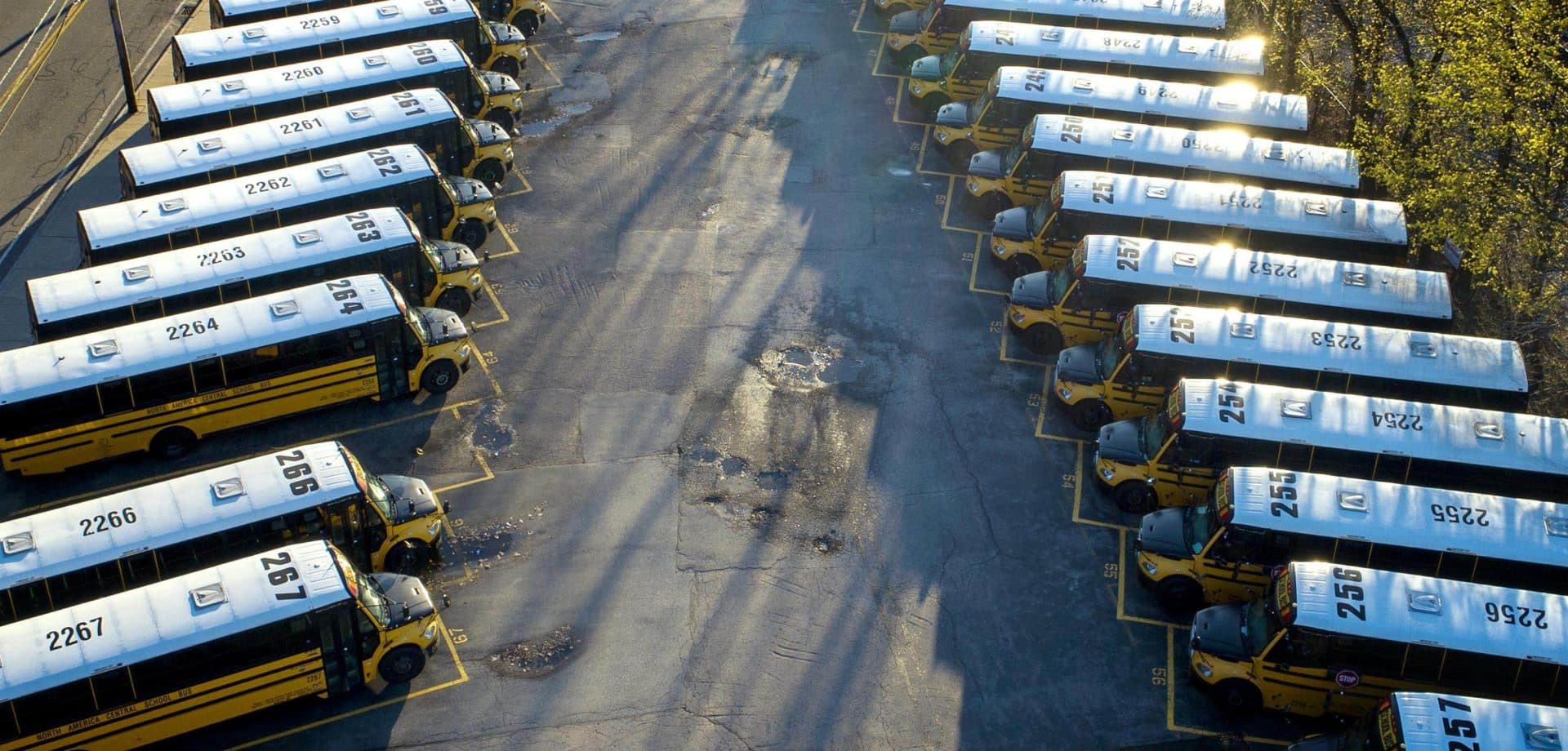Advertisement
Bids and buses: Why districts worry as competition plummets in school bus industry
Play
This is the first of two stories. The second story is here .
Late and unpredictable school buses are a problem that’s received more attention in recent years. The issue has frustrated students, parents and school district leaders across Massachusetts, and many have pointed to a national shortage of bus drivers as a major cause.
But, public school leaders and bus industry officials say the driver shortage is just one factor wreaking havoc on bus schedules. Most Massachusetts school systems partner with outside vendors to bus kids, but over the last decade, competition has plummeted for these million-dollar contracts.
According to the state’s Registry of Motor Vehicles, 66 companies offer school bus services in Massachusetts, and a major school bus industry group in the state estimates that figure is down at least 20% since the 1980s.
School districts say they now face fewer choices, worries about steeper prices and more frustrated phone calls from families. A slim number are now moving to control busing themselves.
The state's education department says while it is monitoring service and complaints over chronic delays in Boston , it isn't observing problems in other districts to the same degree. It added that it points districts with bus schedule woes to information about hiring more drivers. But Boston isn't the only school system that's seen delays.
In Salem, Beth Anne Cornell, a school committee member, said she fields a lot of calls from parents angry about late buses — and even buses that don’t arrive at all. Cornell explained that she often tells parents she’ll call the bus company, North Reading Transportation, but she has a hard time getting through and suspects the company is understaffed.
“You want to call the office to say, ‘hey can you check out the GPS to find out where this bus is?’ ” Cornell said. “But you can’t get someone on the phone, because they’re dealing with crises all over the place.”
The district, Cornell said, feels stuck with the service it gets from this company and its owner Beacon Mobility, a national transit corporation. Its contract was finalized last summer, and the company was the sole bidder for the job.
"It’s not like we’re choosing from among four companies, and we’re choosing the one that’s the best fit for us," said Cornell. "You take what you can get."
A spokeswoman with North Reading Transportation, which also serves Lawrence, Haverhill and Cambridge schools, said the company is working to recruit drivers with hiring bonuses and other incentives.
“The company is in constant communication with our school districts to ensure that students are transported safely to and from school each day," Tim Sheehan, the company’s senior vice president of operations, said in a statement.

Contracts go to the lowest — sometimes sole — bidder
Salem is far from alone in dealing with weak competition for school bus contracts, according to the Massachusetts Association of School Committees and other statewide education groups.
"You get more bids for [school meals] than you do for transportation," said Glenn Koocher, the organization's executive director. "Any district … would be lucky to get a single bid they liked. And would be extraordinarily lucky and rare if they get more than one bidder."
Koocher added many districts in the state also worry that with limited competition for contracts, companies can raise their prices without pressure.
Pam Reipold, president of the industry group School Transportation Association of Massachusetts (STAM), said she understands how this puts schools at a business disadvantage. But, she blames a shrinking industry and says most contractors aren’t inflating prices.
"There’s just not enough buses anymore anywhere across the country," said Reipold, adding that companies with a full roster of bus drivers are in high demand and cost a premium.
Reipold and others with STAM say there are several reasons bus companies, particularly smaller, family-owned businesses, kept folding in recent years.
For one, a state law intended to prevent back-channel deals requires school districts — and all public agencies — pick the lowest “responsible” bidder that meets their contractual needs.
"You don’t have to be the best,” Reipold said. “You don’t have to have the best safety rating, the best maintenance or the newest vehicles."
Another factor Reipold’s group points to is underbidding from larger national companies.
"Family owned businesses … merged with larger companies or just closed their doors as nationwide companies came in and started to underbid the smaller companies to gain a foot print in the state," Tom Hamilton, STAM’s executive director, said in an email.
Underbidding wars in school contracts are an issue facing public schools across the country, according to Sharie Lewis, with the Association of School Business Officials International. And once schools and companies set contracts, she said districts are “kind of hooked unless you got some resources to get out of it.”
The contract stakes can be high for school districts and students.
For years, criticism over unreliable school transportation has plagued Boston, the state’s largest public school district. It’s now collecting proposals for a new five-year bus contract as its current deal with the national company Transdev ends this school year. It’s unclear if Transdev, which did not respond to repeated requests for comment, placed a bid again.
Earlier this month, some of these complaints culminated in a formal complaint to state education leaders from Greater Boston Legal Services and a prominent child advocacy group in the state.
“[Boston Public Schools] transportation services remain inadequate, in complete disarray, and disproportionately impact students of color and students with disabilities,” read the complaint's cover letter .
The Department of Elementary and Secondary Education (DESE) said it is investigating whether the district is violating the rights of certain students with disabilities, and the probe could result in “corrective action, such as training or changes to policies and procedures.”
In a statement, Superintendent Mary Skipper said the district is working with the advocacy groups that filed the complaint to find solutions. She added that, “We appreciate our partnership with DESE and will continue to work to identify areas to improve our transportation system for all students, particularly for our students with disabilities.”
The ongoing problems with Boston’s school buses is perhaps the most widely known, but so many districts struggled with this issue that state lawmakers formed a special commission in 2019 to tackle the matter. By late 2020, the group offered several recommendations, like creating a statewide registry of bus vendors, extending how long a school bus can operate, and adjusting a state law that limits funding for schools that want to operate their own fleet if a private vendor is nearby.
As COVID shifted lawmakers’ priorities, not much happened with the recommendations. But, in an email, state Rep. Alice Peisch said she is hopeful some, if not all, of the proposals will get taken up in the next legislative session.
In the meantime, some school districts are trying to ease the stress on their bus systems to improve services. In Salem, city and school officials mapped out safe pedestrian routes so more students would walk to class. And in Framingham, district leaders last year handed out 100 free bikes and helmets to students.
Worcester school leaders, however, took a more drastic step. Starting this fall, the school system began running its own transportation system after frustrations rose for years with its former bus contractor.
This segment aired on November 2, 2022.
